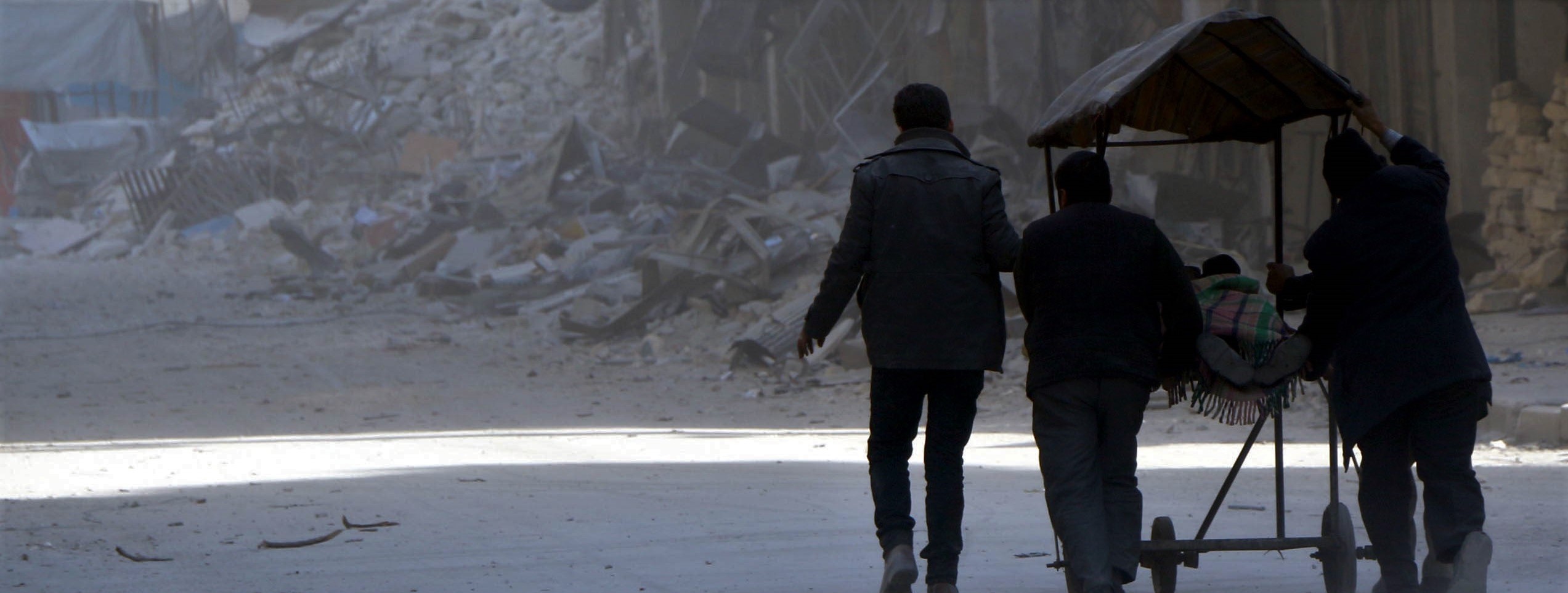'If the aim is to save civilian lives, rebels must leave Aleppo'
In an opinion piece in The Australian, Rodger Shanahan writes that rebels need to concede Aleppo to save civilian lives. Photo: Getty Images/Anadolu Agency

As the world watches the devastating bombardment and ground assault in east Aleppo by the Syrian regime and Russian aircraft, one issue rarely mentioned is the presence of armed rebels among the city’s civilian population.
We see no reports of rebels killed in regime attacks, few details on groups deployed in the city, where their personnel and command centres are situated, or where their equipment, weapons and ammunition are stored. It is as if east Aleppo is occupied solely by civilians.
The UN estimates that of the about 8000 armed rebels, 900 are from the al-Qa’ida-aligned Jabhat Fatah al-Sham. The other groups inside Aleppo include nationalist, Islamist and Salafist rebels. Reports have emerged of infighting among rebel groups. This lack of unity has been a hallmark of the opposition throughout Syria’s civil war.
It is important to understand the posture of the rebels inside Aleppo because international humanitarian law (IHL) applies to all combatants, rebel groups included. If the international community, including the media, rightly seeks to hold to account the Syrian regime and its allies for ignoring the law by not taking sufficient care to avoid civilian casualties, or to adhere to the rules of proportionality in its targeting procedures or use of munitions, then the armed rebel groups need to be held to the same standard. Rebels need to adhere to customary IHL, particularly provisions that relate to protecting civilians from attack. There is a strong argument the rebels in eastern Aleppo, acting as an armed group deployed among the civilian population, are as lax in observing IHL as the regime attacking them.
The ultimate aim in addressing the conflict in eastern Aleppo must be to save civilian lives. Calls to stop the aerial attacks by the regime must be continued, while pressure must be applied to ensure their conduct within recaptured areas meets international standards.
But the time has come for the international community, particularly regional states that back them, to call for all armed groups to leave east Aleppo. Their presence serves absolutely no sensible military purpose other than to attract continued bombardment. The city is besieged, and attempts to relieve the siege by other armed Islamist groups have failed.
No international mission is going to be launched to relieve the siege and there is no realistic policy change that could stop Syrian and Russian aircraft bombing Aleppo. The regime’s ground advance has begun and they have no inclination to desist.
The election of Donald Trump in the US may also presage a reduction if not abandonment of support for rebel groups because of their lack of unity and uncertain loyalties. Trump has already said Aleppo has basically fallen, and Obama has never had much stomach for becoming decisively engaged in Syria when all that such intervention is likely to achieve is somewhat ambiguous strategic outcomes.
The regime has identified the reconquest of Aleppo as its main effort and has allocated resources accordingly. In all likelihood, it will prevail but at an enormous physical and personal cost to those in the besieged city.
The avoidance of IHL by both sides in east Aleppo and the fact that the armed groups in the city have little realistic hope of being relieved raises an uncomfortable question: why are armed groups maintaining a presence among east Aleppo’s civilian population?
During World War II, “open cities” were declared several times by the governing power — indicating it had abandoned all defensive efforts — to save the city and its population from harm when it became obvious that continued resistance would lead only to further bloodshed and destruction for no military purpose.
The Americans did it in Manilla, the French in Paris, the Belgians in Brussels and the Germans in Athens to name a few. If the world is keen to save the lives of Syrians in east Aleppo, it is time pressure is brought to bear on armed groups to leave or redeploy outside the city for the sake of the civilians.
The UN’s Stefan de Mistura has raised the issue previously, even offering to personally escort the 900 al-Qa’ida-affiliated rebels out of Aleppo as a way of removing regime’s and Russia’s justification for bombing the city.
A decision by the rebel groups to declare an open city would be difficult to achieve given their lack of centralised authority, and it would be an admission of defeat. But it could also save thousands of lives.
If the international community and the rebels’ foreign backers advocated for the withdrawal of armed groups from Aleppo, concessions could be negotiated from the Syrian government to allow UN civilian observers to monitor the withdrawal and the city’s reoccupation by Syrian government forces. The armed opposition could leave with its weapons intact, the regime could achieve its military aim and the inhabitants could have some guarantee that the regime would not take reprisals against them in the face of international observers.
Naturally, the regime will make political capital of the fact it has retaken Aleppo, and the international community will feel the brutal tactics of the Assad regime and Russia have been rewarded.
The regime will also likely repeat these tactics — as it has on a smaller scale elsewhere — in other areas. But it would save hundreds or thousands of innocent lives. If the ultimate aim of the international community is to save civilian lives, it must start to negotiate for all armed groups to redeploy out of the city. It will be a bitter pill, but surely saving face takes a back seat to saving lives.

